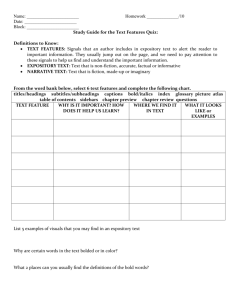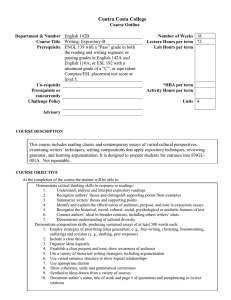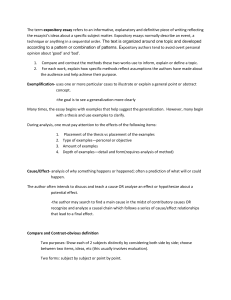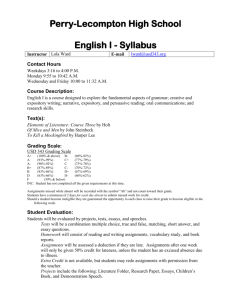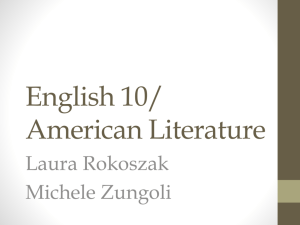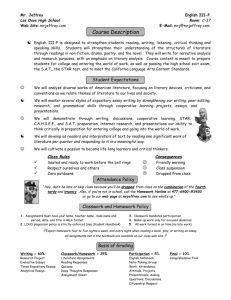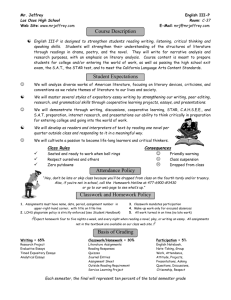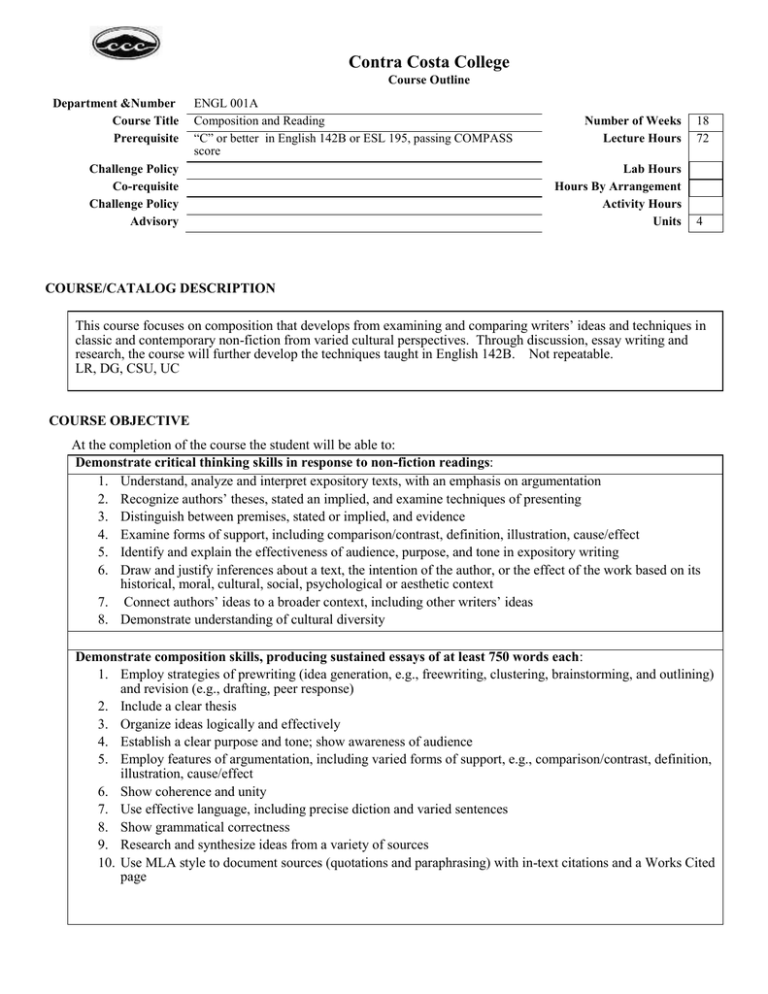
Contra Costa College
Course Outline
Department &Number
Course Title
Prerequisite
ENGL 001A
Composition and Reading
“C” or better in English 142B or ESL 195, passing COMPASS
score
Challenge Policy
Co-requisite
Challenge Policy
Advisory
Number of Weeks
Lecture Hours
Lab Hours
Hours By Arrangement
Activity Hours
Units
18
72
4
COURSE/CATALOG DESCRIPTION
This course focuses on composition that develops from examining and comparing writers’ ideas and techniques in
classic and contemporary non-fiction from varied cultural perspectives. Through discussion, essay writing and
research, the course will further develop the techniques taught in English 142B. Not repeatable.
LR, DG, CSU, UC
COURSE OBJECTIVE
At the completion of the course the student will be able to:
Demonstrate critical thinking skills in response to non-fiction readings:
1. Understand, analyze and interpret expository texts, with an emphasis on argumentation
2. Recognize authors’ theses, stated an implied, and examine techniques of presenting
3. Distinguish between premises, stated or implied, and evidence
4. Examine forms of support, including comparison/contrast, definition, illustration, cause/effect
5. Identify and explain the effectiveness of audience, purpose, and tone in expository writing
6. Draw and justify inferences about a text, the intention of the author, or the effect of the work based on its
historical, moral, cultural, social, psychological or aesthetic context
7. Connect authors’ ideas to a broader context, including other writers’ ideas
8. Demonstrate understanding of cultural diversity
Demonstrate composition skills, producing sustained essays of at least 750 words each:
1. Employ strategies of prewriting (idea generation, e.g., freewriting, clustering, brainstorming, and outlining)
and revision (e.g., drafting, peer response)
2. Include a clear thesis
3. Organize ideas logically and effectively
4. Establish a clear purpose and tone; show awareness of audience
5. Employ features of argumentation, including varied forms of support, e.g., comparison/contrast, definition,
illustration, cause/effect
6. Show coherence and unity
7. Use effective language, including precise diction and varied sentences
8. Show grammatical correctness
9. Research and synthesize ideas from a variety of sources
10. Use MLA style to document sources (quotations and paraphrasing) with in-text citations and a Works Cited
page
COURSE CONTENT: (In detail; attach additional information as needed and include percentage
breakdown)
Course will focus on composition (a minimum of 8,000 words of expository prose in the form of
essays, 2,000 of which may be graded revisions).
40
%
Lecture, discussion and examination of composition strategies for constructing argument focused
essays that employ various rhetorical strategies. Focus on generating and developing ideas,
constructing argument-style thesis statements, and essay organization. Review process for producing
argument style research papers with focus on correct use of MLA style documentation to avoid
plagiarism.
Specific content for composition component:
1. Prewriting and revision activities
2. Exercises to produce focused theses
3. ]Activities to help students find purpose, appropriate tone and specific audience
4. Activities emphasizing argumentation, including varied forms of support –
comparison/contrast, definition, illustration, cause/effect
5. Editing for appropriate diction
6. Grammar review, as needed
7. Activities that help students research and synthesize ideas drawn from a variety of sources
8. Activities using MLA style to document sources (quotations, summaries and paraphrasing)
with in-text citations and a Works Cited page
Teaching reading and comprehension strategies as they relate to expository and narrative texts.
Examining authors’ writing styles to discover effective language use, sentence structure, word choice
for tone and audience awareness. Teaching and discussing strategies for responding to text-based
writing assignments.
Specific content to demonstrate critical reading:
1. Sufficient exposure to a variety of expository texts, including short essays and one booklength work of fiction or non-fiction.
2. Written analysis and interpretation in the students’ own words, including formal summaries
of expository writing demonstrating understanding of authors’ theses and supporting points
3. Written analysis and interpretation that distinguishes between authors’ supporting points
and specific examples
4. Discussions and written responses that identify and explain the effectiveness of audience,
purpose, and tone in expository writing
5. Discussions and written responses that apply one author’s ideas to others for purposes of
comparison and contrast
6. Discussions and written responses that synthesize the ideas drawn from a variety of sources
7. Sufficient exposure to a variety of expository writing by and about diverse people and
cultures
8. Discussions of the value of increasing our awareness of the human condition.
Viewing and discussing media presentations on class-related topics.
Group work on revising and editing strategies. Review and discuss grammar and mechanics of
writing.
40
15
5
METHODS OF INSTRUCTION
1.
2.
3.
4.
5.
6.
Lecture and class discussion
Small group discussions
Peer review and evaluation of coursework
Participation in class presentations
Individual conferences as needed
Multi-media tools
INSTRUCTIONAL MATERIALS
Author:
1. A reader of expository essays or a combined reader/rhetorical text such as
What Matters in America
2. A handbook of style, grammar and documentation
3. One non-fiction or non-fiction book
4. Supplementary reading materials, as appropriate
Goshgarian, Gary
Publisher:
Pearson Longman
Textbook Title:
Edition/Date:
2007
COURSE EXPECTATIONS (Use applicable expectations)
Outside of Class Weekly Assignments
Weekly Reading Assignments
Weekly Writing Assignments
Weekly Math Problems
Lab or Software Application Assignments
Other Performance Assignments
Hours per week
6
2
STUDENT EVALUATION: (Show percentage breakdown for evaluation instruments)
50
15
15
20
%
%
%
%
Essays written outside class
Essays written in-class, midterm
Essays written in-class, end of semester
Participation in class discussions and group work
GRADING POLICY (Choose LG, P/NP, or SC)
X
Letter Grade
90% - 100% = A
80% - 89% = B
70% - 79% = C
60% - 69% = D
Below 60% = F
PASS / No PASS
70% and above = Credit
Below 70% = No Credit
Prepared by:
Joy EichnerLynch
Date: Semester/Year
Fall 2011
Revised 11/08
Student Choice
90% - 100% = A
80% - 89% = B
70% - 79% = C
60% - 69% = D
Below 60% = F
70% and above =Pass
Below 70% = No Pass

